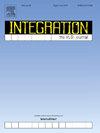CDA-GC: An effective cache data allocation for garbage collection in flash-based solid-state drives
IF 2.2
3区 工程技术
Q3 COMPUTER SCIENCE, HARDWARE & ARCHITECTURE
引用次数: 0
Abstract
In the research of solid-state drive (SSD) performance enhancement, constructing an efficient garbage collection (GC) mechanism is crucial for accelerating device operations and extending their service life, especially in large data processing applications like databases and file systems. Therefore, this paper conducts an in-depth study on the impact of cache management strategies on GC performance and proposes an innovative GC algorithm called Cache Data Allocation GC (CDA-GC). By optimizing data allocation and management within the cache, this algorithm reduces unnecessary data migration during the GC process, thereby improving data processing efficiency and reducing the impact of GC operations on device performance. The core of CDA-GC lies in its innovative cache data management strategy, which can significantly reduce the data migration demands during the GC process. This method not only improves the overall processing performance of SSDs but also reduces the adverse impact of GC activities on device performance by optimizing data access patterns. We implemented and validated the algorithm on the Cosmos+ OpenSSD platform and compared it with existing advanced SSD caching strategies in real-world scenarios. Experimental results show that in database and file system applications, the CDA-GC algorithm can effectively improve performance.
CDA-GC:在基于闪存的固态驱动器中用于垃圾收集的有效缓存数据分配
在SSD (solid-state drive)性能提升研究中,构建高效的垃圾收集(garbage collection, GC)机制对于加快设备运行速度和延长设备使用寿命至关重要,尤其是在数据库和文件系统等大数据处理应用中。因此,本文深入研究了缓存管理策略对GC性能的影响,提出了一种创新的GC算法——缓存数据分配GC (cache Data Allocation GC, CDA-GC)。该算法通过优化缓存内的数据分配和管理,减少了GC过程中不必要的数据迁移,从而提高了数据处理效率,降低了GC操作对设备性能的影响。CDA-GC的核心在于其创新的缓存数据管理策略,可以显著降低GC过程中的数据迁移需求。这种方法不仅提高了ssd的整体处理性能,而且通过优化数据访问模式减少了GC活动对设备性能的不利影响。我们在Cosmos+ OpenSSD平台上实现并验证了该算法,并将其与现实场景中现有的高级SSD缓存策略进行了比较。实验结果表明,在数据库和文件系统应用中,CDA-GC算法可以有效地提高性能。
本文章由计算机程序翻译,如有差异,请以英文原文为准。
求助全文
约1分钟内获得全文
求助全文
来源期刊

Integration-The Vlsi Journal
工程技术-工程:电子与电气
CiteScore
3.80
自引率
5.30%
发文量
107
审稿时长
6 months
期刊介绍:
Integration''s aim is to cover every aspect of the VLSI area, with an emphasis on cross-fertilization between various fields of science, and the design, verification, test and applications of integrated circuits and systems, as well as closely related topics in process and device technologies. Individual issues will feature peer-reviewed tutorials and articles as well as reviews of recent publications. The intended coverage of the journal can be assessed by examining the following (non-exclusive) list of topics:
Specification methods and languages; Analog/Digital Integrated Circuits and Systems; VLSI architectures; Algorithms, methods and tools for modeling, simulation, synthesis and verification of integrated circuits and systems of any complexity; Embedded systems; High-level synthesis for VLSI systems; Logic synthesis and finite automata; Testing, design-for-test and test generation algorithms; Physical design; Formal verification; Algorithms implemented in VLSI systems; Systems engineering; Heterogeneous systems.
 求助内容:
求助内容: 应助结果提醒方式:
应助结果提醒方式:


